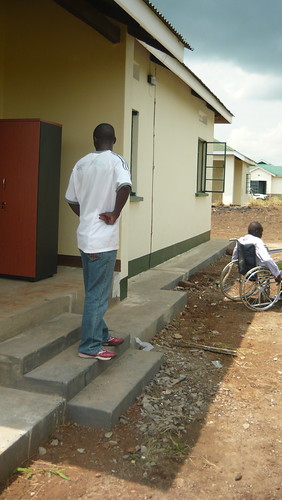The beast of “discrimination” takes many forms. Sometimes it is a blatant and vehement cry of hatred: a 1960s restaurant refusing to serve blacks or the homophobic murder of Matthew Shepard. Sometimes it is done with intentional stealth, in the hopes that nobody will notice: an employer overlooking a female candidate for a position when a pregnancy is disclosed. Sometimes it is subtle and inadvertent: a teacher asking for “four boys to help move a table” when four girls could have done it, too.
In Gulu, I’ve witnessed first-hand discrimination of Persons with Disabilities (PWD). Fortunately, it’s been neither violent nor aggressive, for the most part. People aren’t walking through Gulu pointing and laughing at PWD. They aren’t berating them. This, of course, is a good thing. I can only assume that 20 years of war in Northern Uganda not only caused a heightened number of PWD (estimates show 14-20% of Northern Uganda is a PWD, well above the national average); there’s also a sense that nearly everybody is dealing with something in post-conflict Gulu, whether it’s a physical disability, loss of family members, psychosocial trauma, land-disputes, poverty, etc.
What I’m getting at, however, is the notion of discrimination fueled by ignorance, a catalyst for exclusion, prejudice, and denial of services. It might not be that people WANT to exclude PWD from services, leadership, and employment…it’s just seen as an “easier” solution when you don’t have all the “baggage” that comes with accommodating “special needs.”
Recently, there were several instances of “harmless” discrimination that directly affected GDPU. On July 15, a local hotel in Gulu hosted a workshop for the National Union of Disabled Persons of Uganda (NUDIPU). When it was determined that the venue had been double-booked, NUDIPU’s workshop was moved to the yard under a tent, making the meeting space and bathroom facilities inaccessible for people in wheelchairs. The director of GDPU, Mr. Semakula Fred, attended the workshop…yet he chose to leave early because of the frustrating circumstances, as he uses a wheelchair. Fortunately, the hotel apologized (), which was a huge step; but greater awareness of PWD could have avoided that.
Less than a week later, a GDPU team traveled to Nwoya to meet with the local government. Nwoya is a brand new district, so when we arrived at the government center, construction was actively underway. The office where our meeting took place, however, was just completed…with steps. Only. Two GDPU members – Semakula Fred as well as the Secretary of the Board of Directors – had to be pulled inside the GOVERNMENT center where the cement and paint was still drying. The official apologized sheepishly and ensured a correction…but why now, in 2011, when the government is meant to be at the heart of implementing policies and promoting human rights, is something as simple as a ramp overlooked?
Discrimination exists within the disability community, too. When it comes to leadership opportunities for PWD (a label that includes blind, Deaf, deafblind, physical disability, people with epilepsy, and mental health, among others), 77.5% of District Union leaders are physically disabled, a gross misrepresentation of the different categories of disability (2010 NUDIPU Baseline Survey). Additionally, PWD are generally elected specifically to represent PWD concerns and fill a quota; it’s a start, in terms of representation…but is “disability rights” the only thing a person with a disability is capable of promoting? As a history nerd, I recall that my favorite US President led us through a World War from a wheelchair…
It’s understandable that there would be conflict, as painting “disability” with the same brush of is ultimately unfair. A person who is Deaf, for example, does not necessarily require a ramp to enter a public facility. A person in a wheelchair likely would not need a Sign Language interpreter available at a presentation. And while the sub-communities within the disability movement are supportive of one another, there’s still independent agency required from disability to disability, and again from person to person.
Disability rights is challenging, as one of the goals is a mutual understanding between the PWD and the community at large that “disability” does not – or should not – determine worth or potential. “I might have a disability, but I am capable of the same goals as you. I will do it in my own way.” Until that notion is fully realized, subtle discrimination of PWD persists: being pitied rather than championed; assumed incapable rather than empowered; spoken to rather than listened to; led rather than followed.
Sometimes I find that it is “easier” to fight the crueler versions of discrimination. It’s easy to identify hatred spewed out through bigoted violence and derogatory comments. It’s the subtleties of discrimination that have become woven in our societal fabric, an accepted order of worth, perception, and ability, that will continue to divide.
Posted By Rebecca Scherpelz (Uganda)
Posted Aug 4th, 2011



2 Comments
Ken
August 4, 2011
And this “quiet bias” is not limited to Northern Uganda. We can still see it in supposedly “developed” countries when you look at attitudes towards and treatment of the poor, minorities, our own PWD, gays & lesbians, etc.
Rebecca Scherpelz
August 4, 2011
Agreed. It’s a universal issue and one that is best addressed through education and inclusion.